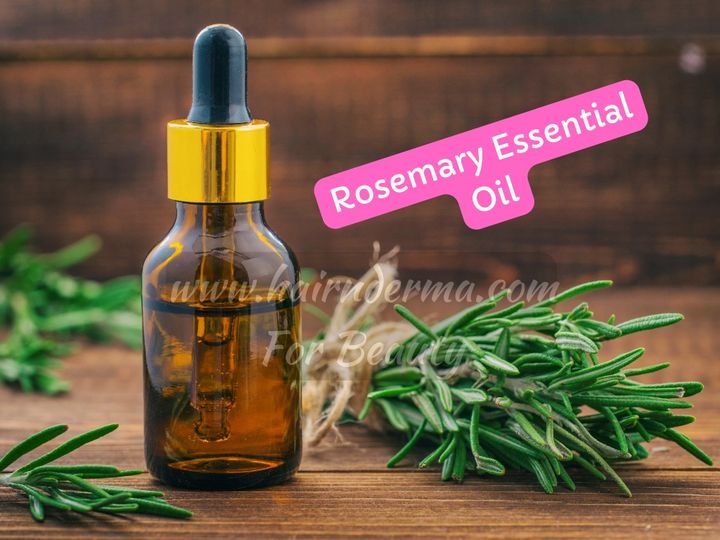Rosemary essential oil is a nervous system stimulant, energizing when inhaled. For both external and internal use, rosemary essential oil provides many benefits. It uses as an anti-cellulite and purifier. Let’s find out all its features.
What is rosemary essential oil?
Rosemary essential oil is extracted from Rosmarinus Officinalis, a plant of the Labiate family.
We know it for its stimulating and purifying properties. It is also helpful as a cardiotonic and anti-cellulite.

Rosemary is a highly branched, bushy, evergreen shrub that reaches two meters in height. This aromatic plant covers very thick leaves. They are small and linear, dark green above and whitish underside due to the covering hair.
The plant’s flowers are blue and gathered at the ends of the branches, and they have only two male stamens. It grows spontaneously on the shores of the Mediterranean, spreads all over the world, and is grown intensively in orchards.
Properties and benefits of rosemary essential oil
When you inhale rosemary essential oil, it energizes the nervous system by stimulating it. This effective essential oil promotes concentration and improves memory, especially during intense pressure for intellectual activities.

It has an overall toning effect if you use rosemary essential oil in the morning. It melts and activates your emotional components, inspires courage, and strengthens willpower. The true enemy of illusions teaches us to look far and clearly perceive the nuances of life. So what are the benefits of rosemary essential oil? Here are the benefits of rosemary essential oil:
- The benefits of rosemary essential oil are endless. Cardiotonic, this essence has a pronounced effect on the heart. It indicates asthenia, low blood pressure, weakness and fatigue, and even mental states.
- It has cleansing properties. Adding 2-3 drops of rosemary essential oil to half a teaspoon of honey stimulates bile drainage and digestion. It also removes waste and supports the detoxifying activity of the liver by dissolving stagnation in the body.
- Thanks to its anti-cellulite, lipolytic effect (melting fat), manufacturers use this essential oil as a component in cosmetic products against cellulite or regional lubrication. Also, this oil stimulates peripheral circulation and drains the lymphatic system.
- It has anti-inflammatory properties. If you dilute this essential oil with sweet almond oil and massage it locally, it will reduce your joint and muscle pain. It also hardens uric acid and epidermal tissues and dissolves crystals that cause edema, swelling, and water retention.
Astringent properties are also among the benefits of rosemary oil. Thus, it has a tonic, antiseptic and purifying effect on the skin. It is helpful in the treatment of acne and blackheads on the skin. Due to these properties, many companies use this oil to stimulate circulation and promote tissue oxygenation and hair regrowth. In particular, companies use it as an ingredient in lotions and shampoos for oily hair with dandruff and to prevent hair loss.
Use and practical advice on rosemary essential oil
You can refer to the following methods for using rosemary essential oil:
- Environmental diffusion: You can use 1 g of rosemary essential oil for each square meter of environment, where it is diffused into the water of radiator humidifiers or through an essential oil burner to freshen the air, deodorize and increase concentration.
- Anti-cellulite oil: Dilute 5 – 10 drops in 100 ml of sweet almond oil and rub. It solves the problem of fat cellulite and water retention. It supports poor oil circulation in the thighs and buttocks.

- Toning bath: Dilute 10-15 drops of essential oil in a tub of water to calm down and neutralize tension, and fight stress in the presence of rheumatism, muscle pain, arthritis, bruises, and sciatica.
- Anti-hair loss shampoo: Pour a few drops into a neutral shampoo and continue washing if you have weak, brittle, oily hair with dandruff or alopecia. Finally, if a few drops are applied to damp hair and scalp, it becomes a panacea.
What are the contraindications of rosemary essential oil?
Rosemary essential oil is non-irritating. But it would be best if you didn’t always use it diluted and for a long time. Be careful with the amounts because they can be toxic when used internally in high doses. It contraindicates in pregnancy, epilepsy patients, and children.

Background
It takes its name from the Latin word Rosa Maris, meaning sea rose. The Egyptians knew this extract’s bactericidal and antiseptic effects and used it in tombs.
Even in Greece, people burned its branches in temples instead of precious Arabian incense. The ancient Romans grew rosemary on tombs as a symbol of immortality. In the Metamorphoses, Ovid describes the plant as the result of the transformation of the princess Leucotoe by the sun god Apollo, who fell in love with and seduced this magnificent girl, the daughter of the Persian king.
The healing and culinary properties are the most significant properties of this oil. In many ancient ruins, experts have found that people used this essential oil as a remedy for the liver, brain, and heart. In popular tradition, people used it against plague and infectious diseases.
Sources:
https://pubmed.ncbi.nlm.nih.gov/32963731/
https://pubmed.ncbi.nlm.nih.gov/34945695/
https://pubmed.ncbi.nlm.nih.gov/24269249/
What is rosemary essential oil used for?

Rosemary essential oil uses for various purposes, including as a natural remedy for several health conditions. It believes to have anti-inflammatory, antimicrobial, and antioxidant properties, making it helpful in treating ailments such as headache, muscle pain, and skin irritation. It is also used in aromatherapy to help improve mood and cognitive function. Some people use it in hair care products to promote growth and prevent dandruff.
Can rosemary oil regrow hair?
There is some evidence that rosemary essential oil may help promote hair growth. In a study published in the journal Evidence-Based Complementary and Alternative Medicine, researchers found that rosemary oil significantly improved hair growth in mice. However, more research is needed to determine whether rosemary oil is effective for hair growth in humans. It is crucial to remember that essential oils should be used with caution, as they can irritate the skin and mucous membranes. Always dilute essential oils in a carrier oil before applying them to the skin, and do a patch test to ensure you aren’t allergic to the oil. Consult a qualified healthcare provider before using essential oils for any medical condition.
What happens if you put rosemary oil directly on the skin?
Applying rosemary essential oil directly to the skin can cause irritation, redness, and rash in some people. This is because essential oils are highly concentrated plant extracts, which can irritate the skin if used undiluted. It is important to always dilute essential oils in a carrier oil before applying them to the skin and to do a patch test to make sure you aren’t allergic to the oil. If you experience any irritation or other adverse effects after applying rosemary oil to your skin, wash the area with soap and water and contact a healthcare provider if necessary. It is also important to avoid using essential oils near the eyes, nose, and mouth, as they can be irritating to these delicate tissues.
Can you put rosemary oil directly on your scalp?
Applying rosemary essential oil directly to the scalp is generally not recommended. Essential oils are highly concentrated plant extracts that can irritate the skin if undiluted. In addition, essential oils can be absorbed through the skin and enter the bloodstream, potentially leading to adverse effects. To use rosemary oil on your scalp, it is best to dilute it in a carrier oil such as jojoba or coconut oil. Mix a few drops of rosemary oil with a tablespoon of carrier oil, then massage the mixture into your scalp. Be sure to do a patch test to ensure you aren’t allergic to the oil before applying it to your scalp. If you experience any irritation or other adverse effects after using rosemary oil on your scalp, wash the area with soap and water and contact a healthcare provider if necessary.
What happens if you leave rosemary oil in your hair overnight?
Leaving rosemary essential oil in your hair overnight isn’t recommended. Essential oils are highly concentrated plant extracts that can irritate the skin if undiluted. In addition, essential oils can be absorbed through the skin and enter the bloodstream, potentially leading to adverse effects. If you accidentally leave rosemary oil in your hair overnight, wash your hair with shampoo as soon as possible to remove the oil. Contact a healthcare provider if you experience any irritation or other adverse effects. It is best to dilute essential oils in a carrier oil before applying them to the skin or hair and to use them only as directed.
Is it OK to leave rosemary oil on your scalp overnight?
Leaving rosemary essential oil on your scalp is generally not recommended overnight. Essential oils are highly concentrated plant extracts that can irritate the skin if undiluted. In addition, essential oils can be absorbed through the skin and enter the bloodstream, potentially leading to adverse effects. If you accidentally leave rosemary oil on your scalp overnight, wash your hair with shampoo as soon as possible to remove the oil. Contact a healthcare provider if you experience any irritation or other adverse effects. It is best to dilute essential oils in a carrier oil before applying them to the skin or hair and to use them only as directed.
How long does it take for rosemary oil to regrow hair?
There is no set amount of time it takes for rosemary essential oil to regrow hair, as this can vary depending on several factors, such as the individual’s age, health, and hair type. In a study published in the journal Evidence-Based Complementary and Alternative Medicine, researchers found that rosemary oil significantly improved hair growth in mice. However, more research is needed to determine whether rosemary oil is effective for hair growth in humans. It is crucial to remember that essential oils should be used with caution, as they can irritate the skin and mucous membranes. Always dilute essential oils in a carrier oil before applying them to the skin, and do a patch test to ensure you are not allergic to the oil. Consult a qualified healthcare provider before using essential oils for any medical condition.
Does rosemary oil have side effects?
Rosemary essential oil can cause side effects in some people. Common side effects include skin irritation, redness, and rash when the oil applies to the skin. It can also cause allergic reactions in some individuals. In addition, rosemary oil should not take orally, as it can be toxic if ingested in large amounts. If you experience any adverse effects after using rosemary oil, stop using it and contact a healthcare provider if necessary. It is important to dilute essential oils in a carrier oil before applying them to the skin and to do a patch test to ensure you aren’t allergic to the oil. Always follow the instructions on the product label and consult a qualified healthcare provider if you have any questions or concerns.
Do I need to dilute rosemary oil before applying it to the scalp?
Yes, it is crucial to dilute rosemary essential oil before applying it to the scalp. Essential oils are highly concentrated plant extracts that can irritate the skin if undiluted. To use rosemary oil on your scalp, mix a few drops with a tablespoon of carrier oil such as jojoba or coconut. Massage the mixture into your scalp, carefully avoiding the eyes, nose, and mouth. It is also essential to do a patch test to ensure you aren’t allergic to the oil before using it on your scalp. If you experience any irritation or other adverse effects after using rosemary oil on your scalp, wash the area with soap and water and contact a healthcare provider if necessary.
What is the best carrier oil for rosemary oil?
When using rosemary oil, the best carrier oil is lightweight and easily absorbed by the skin. Some good options include jojoba oil, sweet almond oil, and grapeseed oil. These oils will help to dilute the rosemary oil and make it easier to apply to the skin without irritating it. It’s important to remember always to use rosemary oil in moderation, as it can be irritating to some people when used in high concentrations.
Do I put rosemary oil in wet or dry hair?
It is generally best to apply rosemary oil to dry hair, as this will allow the oil to penetrate the hair shaft and provide the most benefits. If you apply the oil to wet hair, it may not be absorbed as well and may offer less help. To use rosemary oil for your hair, you can either apply a few drops directly to your scalp and massage it in or mix it with a carrier oil such as jojoba or sweet almond oil and apply it to your hair and scalp. This can help to promote healthy hair growth and prevent hair loss. It’s also important to remember to use rosemary oil in moderation, as using too much can irritate the scalp.
What happens if you use rosemary oil without diluting it?
It is generally not recommended to use rosemary oil without diluting it first, as it can irritate the skin and mucous membranes. Rosemary oil is a very potent oil; using it undiluted can cause redness, itching, and burning sensations on the skin. It can also irritate the eyes, nose, and mouth if it comes into contact with these areas. To avoid these potential side effects, it’s important to always dilute rosemary oil before using it on the skin or in hair products. You can do this by mixing a few drops of rosemary oil with a carrier oil such as jojoba or sweet almond oil, which will help dilute the rosemary oil and make it safer.
When should you not use rosemary essential oil?
There are a few situations where it is best to avoid using rosemary essential oil. For example, if you are pregnant or breastfeeding, it is generally recommended to avoid using rosemary oil due to its potential effects on the uterus and hormonal balance. Additionally, people with high blood pressure or epilepsy should avoid using rosemary oil, as it can potentially exacerbate these conditions. Finally, if you have sensitive skin, it is essential to use rosemary oil in moderation and always dilute it with carrier oil to avoid irritation. It’s always best to consult with a healthcare provider before using any essential oil, especially if you have any underlying medical conditions.
Why do you put essential oils behind your ears?
Some people apply essential oils to their ears for various reasons. One reason is that the skin behind the ears is relatively thin, which allows the oils to be absorbed more easily. Additionally, the area behind the ears is close to the lymph nodes, which play a role in the body’s immune system. Applying essential oils to this area may stimulate the lymphatic system and support the body’s natural immune response. Finally, some people believe that using essential oils behind the ears can help to provide a subtle and subtle aroma that can be calming and relaxing. It’s important to remember that essential oils should be used with caution and always diluted before applying them to the skin.
What is the difference between rosemary oil and rosemary essential oil?
The terms rosemary oil and rosemary essential oil often uses interchangeably, but they actually refer to two different products. Rosemary oil makes by mixing rosemary extract with a carrier oil, such as jojoba or sweet almond oil. This creates an effect that is less concentrated than pure rosemary essential oil and generally considers safer and less irritating to the skin. On the other hand, Rosemary essential oil is made by steam distilling the leaves and flowers of the rosemary plant, which produces a highly concentrated oil. Rosemary essential oil is more potent than rosemary oil and should use cautiously, as it can irritate in high concentrations.
Can I apply rosemary oil to my face?
You can apply rosemary oil to your face, but it’s essential to use it carefully and dilute it first to avoid irritation. Rosemary oil can be potentially irritating to the skin, especially for those with sensitive skin. To use rosemary oil on your face, mix a few drops of the oil with a carrier oil such as jojoba or sweet almond oil and apply it to your face using a cotton ball or pad. This can help to dilute the oil and make it easier to apply to the skin. It’s also essential to do a patch test on a small area of skin before applying the oil to your face to ensure that you don’t have any adverse reactions. If you have sensitive skin or are unsure about using rosemary oil on your face, it’s always best to consult a healthcare provider before using it.
Is rosemary oil good for wrinkles?
While some evidence suggests that rosemary oil may have anti-inflammatory and antioxidant properties, there is little scientific evidence to support the claim that it can help reduce wrinkles. Generally, it is always best to consult a dermatologist before using any new skincare product, especially if you have sensitive skin.


